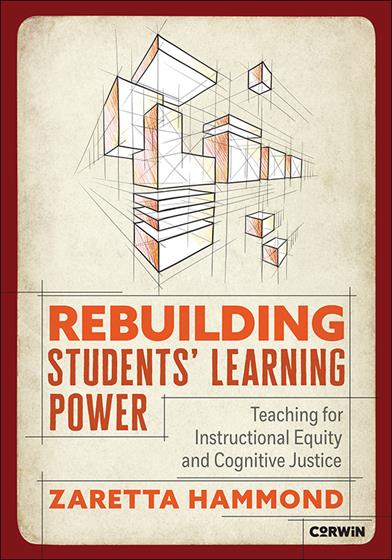Quote by Sharif El-Mekki, CEO, Center for Black Educator Development (CBED): "While there's a push to ignore the historical racial and class-based context of educational inequity in American school systems, Zaretta Hammond's powerful Rebuilding Students’ Learning Power: Teaching for Instructional Equity and Cognitive Justice invites us to confront the issue head on, while simultaneously providing constructs to engage in agentic behaviors as educators.Zaretta highlights the realities of educational redlining and makes the case for new pedagogical approaches to repair the damage done by the underdevelopment of students’ cognitive development by creating Cognitive Apprenticeship Models in classrooms that will help build students’ meta-learning skills.A constricted mindset that contributed to undermine the achievement of both educators and students is the prevailing and maddening belief that the persistent achievement gap between Black, Latino, Indigenous students, and low-income students on one side and white and Asian American students is due to a lack of student motivation.Zaretta emphatically and effectively argues that because we too often take this narrative as the central problem, our equity efforts narrowly revolve around improving relationships through cultural affirmation and advocating grit rather than a focus on instruction that improves students’ cognitive abilities. The low expectations we as educators have for our own self-efficacy inevitably translates into even lower expectations for our students.The failure to educate students of color and poor students is not a bug in our education system but a key feature of the system. Raking a few geniuses from the rubbish wasn't just Thomas Jefferson's bent and vision on education systems, it was a characteristic of our school systems honed by years of policy and practice.Cognitive underdevelopment for deeper learning is at the root of our chronic achievement gaps for most historically marginalized student groups. The lack of motivation is simply a symptom, a response to an derisive and divisive approach that doesn't allow for full citizenship starting with our youngest citizens – our students.A transformative and necessary read, Rebuilding Students’ Learning Power exposes how systemic inequities—not student motivation—drive achievement gaps. Rejecting compliance-based pedagogy, Zaretta's book offers a compelling roadmap for using culturally responsive, research-driven instruction to rebuild students’ cognitive capacity, agency, and learning identity.In essence, Rebuilding Students’ Learning Power is a call to action for educators ready to teach for equity, intellect, and ultimately, educational justice."
"While there's a push to ignore the historical racial and class-based context of educational inequity in American school systems, Zaretta Hammond's powerful Rebuilding Students’ Learning Power: Teaching for Instructional Equity and Cognitive Justice invites us to confront the issue head on, while simultaneously providing constructs to engage in agentic behaviors as educators.Zaretta highlights the realities of educational redlining and makes the case for new pedagogical approaches to repair the damage done by the underdevelopment of students’ cognitive development by creating Cognitive Apprenticeship Models in classrooms that will help build students’ meta-learning skills.A constricted mindset that contributed to undermine the achievement of both educators and students is the prevailing and maddening belief that the persistent achievement gap between Black, Latino, Indigenous students, and low-income students on one side and white and Asian American students is due to a lack of student motivation.Zaretta emphatically and effectively argues that because we too often take this narrative as the central problem, our equity efforts narrowly revolve around improving relationships through cultural affirmation and advocating grit rather than a focus on instruction that improves students’ cognitive abilities. The low expectations we as educators have for our own self-efficacy inevitably translates into even lower expectations for our students.The failure to educate students of color and poor students is not a bug in our education system but a key feature of the system. Raking a few geniuses from the rubbish wasn't just Thomas Jefferson's bent and vision on education systems, it was a characteristic of our school systems honed by years of policy and practice.Cognitive underdevelopment for deeper learning is at the root of our chronic achievement gaps for most historically marginalized student groups. The lack of motivation is simply a symptom, a response to an derisive and divisive approach that doesn't allow for full citizenship starting with our youngest citizens – our students.A transformative and necessary read, Rebuilding Students’ Learning Power exposes how systemic inequities—not student motivation—drive achievement gaps. Rejecting compliance-based pedagogy, Zaretta's book offers a compelling roadmap for using culturally responsive, research-driven instruction to rebuild students’ cognitive capacity, agency, and learning identity.In essence, Rebuilding Students’ Learning Power is a call to action for educators ready to teach for equity, intellect, and ultimately, educational justice."
Sharif El-Mekki
CEO, Center for Black Educator Development (CBED)


